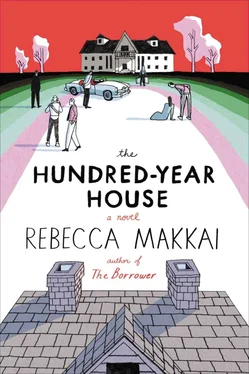“Wouldn’t the right thing, technically, be to give it back to the Devohrs?”
“The Devohrs left Grace out here with an alcoholic husband, and they never once came to see her. Never once.” She pointed a finger right at him, as if he were trying to argue otherwise. “We had a plan in case they did, a whole elaborate plan. But it never happened. They made it easy for me. It was easy because they never showed up, and it was easy because I never felt bad. And they don’t need it, do they? Zilla’s the one always talking about Marxism, and look! Here I am, little old me, redistributing the wealth!”
“Oh. God.” There was still the possibility this was all a bribe, Gracie’s chance to cover up something gruesome, to get out of town before Doug turned her in. That’s what Miriam would have said.
“There’s money to get it started. I know how much these things cost, I’m not naïve, and there’s plenty. Of course it’s mostly Bruce’s money at this point, so he’s the one to thank. I was nearly broke before he came along. And poor sweet Miriam can help you. She knows the art world. She’d know how to build a studio. Why she married that pompous ass is beyond me, but otherwise she’s a smart girl.”
Doug realized that in the time she’d been talking, every color in the kitchen had grown brighter. His mind was listing reasons why this wasn’t a tenable plan, but it was thinking twice as fast of what would need to be done, planning where people would sleep, what grants could be applied for, what Leland could bring to the table. Doug would have a job. He’d have a life. He felt as if he’d stepped into the Happensack, into its vertiginous abundance.
Leland would tell him he was a sucker, and Miriam would worry Gracie was leaving them with a basement full of dead bodies or worse, but when you’re drowning in the ocean and someone throws you a rope, you don’t ask what it’s made of.
He said, “I have to talk to Miriam. I’d have to tell her — I mean, what could I tell her?”
“Don’t worry about it.” She smiled, and he knew it must have been painfully obvious that he’d already told Miriam everything. “Go talk to her now.”
And he got his things, and he walked back to the coach house.
No, look: He was running.
Summer and fall swept through with a cleansing, scorching heat, and when the students returned to campus, they eagerly told the few seniors returning from a year abroad the story of Professor Grant walking off campus nude.
There was Old King Cole. His Melville class applauded him the first day. For still being there, for still being Cole, for waggling those eyebrows and saying, “You don’t kill an old virus that easy.”
When students came to his office, he pointed to the little framed photo on the wall, the girl and her father. She was reading and she was happy. Each time he’d say, “That’s a picture of the bravest woman in the world.”
On June 10, 2001, a poet named Sara Calovelli pulled into the Laurelfield driveway in a dying Honda Civic with Ohio plates. Though eight more artists and writers and composers would arrive later that afternoon, she was officially the first resident of the Laurelfield Arts Colony in forty-seven years.
Doug and Miriam ran out from the office to meet her, and introduced her to Ben, who’d get her settled in the main house. Dinner was at six, they told her, and then there would be a bonfire out back. When Sara had disappeared through the front door with her suitcase, Miriam did a little jump and clapped her hands.
The chef had the grill going, Sofia and her crew were putting out soaps and towels, and Denise and Chantal worked frantically from the office that used to be the coach house TV room, dealing with all the last-minute things like medical forms.
Everything had fallen into place — money, staffing, town approval — with such ease and speed that Doug and Miriam kept waiting in vain for something to go terribly wrong. That winter, they’d received a donation from some Miss Abbaticchio, an elderly woman in town, that surpassed even the money Gracie had left. The desks from the attic were all still usable. The Illinois Arts Council came through nicely.
The buzz they’d built in the year of frantic work created a deep applicant pool, and Miriam and Leland knew the right people to rope into admissions panels and a board. An article in the Tribune , “Refounding a Haven,” came out the same day Doug learned that Zee was living with a sixty-year-old physics professor.
And it was the strangest thing: That night, as he lay in bed, he had to remind himself to feel sad.
His bed was downtown now, in an apartment above the bagel shop. Miriam stayed in the coach house, and Doug and Zee’s old quarters had become a guest room and studio.
Gracie had sent them congratulatory flowers, delivered that morning. She wrote them occasional notes from Sedona, which Doug took to be some kind of proof. (“Her going where she said she’d go proves exactly nothing,” Miriam said.)
They sat next to the driveway, and Miriam picked up a handful of its smooth gravel: white and tan and black. She arranged the stones in a trail down her shin.
Doug said, “Are you tessellating yourself?”
She said, “I’ve had a funny thought all day. It seems like this is the only way things could have turned out. You know? Like all the bizarre and horrible things that happened, they pushed us both here. The colony was taken away, the house went back to the Devohrs, and after everything here we are, two people who aren’t even Devohrs, opening it back up.”
Doug laughed and said, “You think the house just really wanted to be a colony again? It missed all the artists, so it smashed that car and waited half a century?”
“I wasn’t going to say the house,” Miriam said. “I was going to say ghosts.”
At some point they’d agreed that if he could believe Gracie’s story, she could believe in her ghosts, and he wasn’t allowed to laugh.
Doug said, “Last chance to dig up the greenhouse. Before that writer gets here.”
“Ha.”
“Just to prove I’m not a gullible ass.”
“We’ll never do it. It’s such a great studio. If I were a writer, it’s the studio I’d want.” She cleared the gravel from her leg and it fell on the driveway with a sound like rain. “Even if we did,” she said, “even if we found bones. What would it prove? You’ll never know the whole story. You realize that, right? That you’ll never know.”
Doug looked at her, speechless. She was right. Like so much she said, it was a revelation. It was also an absolution.
—
Before dinner, there were cocktails in the library. The travel-weary artists revived, chattering and checking out the displays. Doug had filled the shelves with copies of all the books and musical scores he could find by the earlier generation of residents, and books of art prints as well. He’d even hunted down Marlon Moore’s only published work, which seemed to have predated the attic manuscript. Moore turned out to have been a local writer, a professor in Zee’s old department in the late twenties. The novel, Jack of the Woods , was truly awful, but Moore’s spot on the shelf was one of Doug’s favorites.
Doug had finally convinced Miriam that what would make the room complete was to put the Happensack above the fireplace, where Gracie’s farmhouse painting had once hung. They’d wanted to install it before the guests arrived, but they ran out of time. There were so many little crises in those final days of preparation. For now, the spot was empty.
After dinner, the artists toured the grounds — the reconstructed cabin studios, the wood-chip path to the bear statue — and gathered at the bonfire, which Leland had roaring. Beside him on the ground was a stack of things to be burned.
Читать дальше












